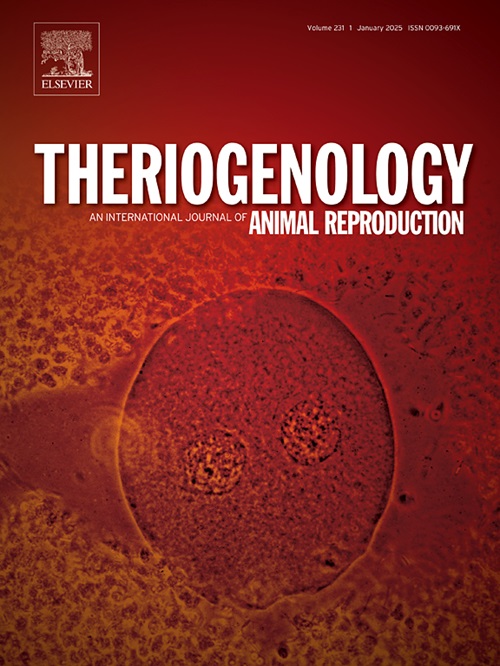Unveiling the equine placental transcriptome: A novel study on ICSI-derived pregnancies
IF 2.4
2区 农林科学
Q3 REPRODUCTIVE BIOLOGY
引用次数: 0
Abstract
Alterations during the early stages of embryo development have been associated with long-term effects on the fetus, neonate, and adult, but this has not been investigated in horses. In recent years, intracytoplasmic sperm injection (ICSI) has gained in commercial popularity in the equine population. Research suggests an association between ICSI-produced embryos and placental malformations, but there exists little understanding of the physiology involved. Therefore, we aim to produce a complete transcriptomic analysis of chorioallantois and provide potential pathways that may be impacted following pregnancies associated with in vitro-produced equine embryos. To do so, seventeen warmblood mares were bred either naturally to produce in vivo-produced pregnancies that were carried by self (in vivo; n = 8) or with in vitro-produced pregnancies created via intracytoplasmic sperm injection (ICSI) that were transferred to a recipient (in vitro; n = 9). Mares were monitored throughout gestation to ensure the health of the pregnancy, and impending parturition was monitored for progress. Chorioallantois was collected immediately postpartum and placed in RNALater for future extraction. RNA was isolated using Trizol, and RNASeq was performed by Novogene, with 93.3 % total mapping and 40 million read depth. The false discovery rate (FDR) was set to <0.05. When comparing groups (in vivo vs. in vitro-produced embryos), 1589 genes were differentially expressed. This included an upregulation of 626 genes, alongside a downregulation of 963 genes. Impacted gene ontology included aspects of the central dogma of molecular biology, including ribosome biogenesis, RNA polymerase activity, and spliceosome function. Additional biological processes that were impacted included aspects of the immune system relating to auto-immunity and disordered antigen response, such as the IL-17 signaling pathway, rheumatoid arthritis, and lupus. Additionally, pathways relating to hypoxia and ribosome biogenesis were associated with in vitro-produced pregnancies. Overall, it appears that the in vitro production of pregnancies is associated with placental dysregulation during pregnancy, which may be related to poor fetal and neonatal outcomes that have been associated with ART in other species.
揭示马胎盘转录组:icsi衍生妊娠的新研究
胚胎发育早期阶段的改变与胎儿、新生儿和成人的长期影响有关,但尚未在马身上进行研究。近年来,卵胞浆内单精子注射(ICSI)在马种群中获得了商业普及。研究表明,icsi产生的胚胎与胎盘畸形之间存在关联,但对其中涉及的生理学知之甚少。因此,我们的目标是对绒毛膜尿囊进行完整的转录组学分析,并提供与体外生产的马胚胎相关的怀孕后可能受到影响的潜在途径。为了做到这一点,17匹温血母马要么自然繁殖,要么在体内怀孕,由自己(在体内;n = 8)或通过胞浆内单精子注射(ICSI)产生的体外妊娠转移到受体(体外;n = 9)。母马在整个妊娠期间进行监测,以确保妊娠健康,并监测即将分娩的进展情况。产后立即收集绒毛膜尿囊,放置于RNALater中以备将来取出。Trizol进行RNA分离,Novogene进行RNASeq,总作图率为93.3%,读取深度为4000万。错误发现率(FDR)设为0.05。当比较各组(体内和体外产生的胚胎)时,1589个基因存在差异表达。这包括626个基因的上调,以及963个基因的下调。受影响的基因本体包括分子生物学中心法则的各个方面,包括核糖体生物发生、RNA聚合酶活性和剪接体功能。受影响的其他生物过程包括与自身免疫和无序抗原反应相关的免疫系统方面,如IL-17信号通路、类风湿关节炎和狼疮。此外,与缺氧和核糖体生物发生有关的途径与体外产生的妊娠有关。总的来说,体外生产妊娠似乎与妊娠期间胎盘失调有关,这可能与其他物种中与抗逆转录病毒治疗相关的胎儿和新生儿预后不良有关。
本文章由计算机程序翻译,如有差异,请以英文原文为准。
求助全文
约1分钟内获得全文
求助全文
来源期刊

Theriogenology
农林科学-生殖生物学
CiteScore
5.50
自引率
14.30%
发文量
387
审稿时长
72 days
期刊介绍:
Theriogenology provides an international forum for researchers, clinicians, and industry professionals in animal reproductive biology. This acclaimed journal publishes articles on a wide range of topics in reproductive and developmental biology, of domestic mammal, avian, and aquatic species as well as wild species which are the object of veterinary care in research or conservation programs.
 求助内容:
求助内容: 应助结果提醒方式:
应助结果提醒方式:


